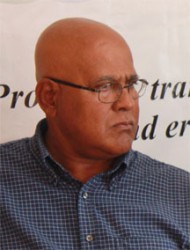Former Auditor General of Guyana Anand Goolsarran says that if the government gets its way and Cabinet retains a permanent role in the procurement process, it could undermine the Public Pro-curement Commission (PPC) when it is finally set up.
Government is insisting on Cabinet retaining a no-objection role in public procurement even with the constituted PPC, a departure from its position in 2003 during the debate on the Procurement Bill 2003, when it said Cabinet’s role would “fade away” once the Commission fructifies.
Government’s insistence on Cabinet’s role in the process has become a major sticking point for the establishment of the PPC although Goolsarran, the President of Transparency Institute of Guyana Inc, does not believe that the administration has made a compelling case for the hold up.

Goolsarran told Stabroek News that he found it strange that Presidential Adviser Gail Teixeira would say government had not approved of the amendment that she said slipped into the Procurement Bill in 2003.
Teixeira had told this newspaper that in the midst of the debate, there was a sidebar with the Speaker Ralph Ramkarran, Winston Murray of the PNCR and then Attorney General Doodnauth Singh, who together came up with an amendment which says Cabinet will eventually no longer have a role in procurement. Teixeira said that this was done without the knowledge and approval of Cabinet at the time. But Ramkarran, in a letter carried in this newspaper on July 15, 2013, rejected Teixeira’s statements about his involvement in the amendment’s inclusion in the Procurement Bill 2003.
Goolsarran is contending that government—which then held a majority in the Parliament— must be more accountable for the decision made to insert an amendment that would see Cabinet’s role reduced with the PPC becoming operational. “If there were last minute changes [to the Bill] that’s fine, but at that time they were in the majority. If they are going to approve something, even a last minute change, they have an obligation to scrutinise it… they wouldn’t just vote like that,” Goolsarran said. “So I find it strange that Teixeira would come now and say that there were last minute changes, they did not agree but they nevertheless voted, and they were in the majority,” he said.
“If that was the case, that was June 2003. What happened to the rest of 2003? What happened to 2004? What happened to 2005 [and so forth]? Now we are in 2013 and suddenly you’re going to say something?” he asked.
“Let us say that in 2003 they did not agree and for some reason everybody voted as a result of a misunderstanding or miscommunication, why was it that they did not seek to take corrective action before now?” he asked. “Why now when under pressure from stakeholders, including the international funding agencies and foreign embassies?” he asked.
Goolsarran said that despite the posturing of the government in using the vexing amendment as an excuse, the Constitution requires the setting up of a PPC. “We have to respect the Constitution. The Procurement Act came after [the constitutional amendments of 2001 requiring the PPC]. The Procure-ment Act acknowledges that there is a constitutional requirement for the PPC and that until such time that the PPC is in place Cabinet will continue its involvement,” he said.
Goolsarran recalled that in 2012, Prime Minister Sam Hinds gave a commitment that the PPC will be set up in the not too distant future. He reminded too that Minister of Foreign Affairs Carolyn Rodrigues-Birkett had given a commitment while responding to a question in the House that the PPC would be set up before the end of June 2012. “There was no mention that there was a problem,” he said of the commitments that Hinds and Rodrigues-Birkett gave.
“The explanation of the government does not satisfy me. To me, it is just trying to justify the lack of action.” Goolsarran said.
Noting that it is never good to have politicians involved in the procurement process, he said that politicians should be removed from it completely to make way for technically competent persons.
Taking on government’s assessment of its role in procurement–that Cabinet does not approve contracts but only gives a no-objection–Goolsarran said that the two terms were not dissimilar. He added that none of the tender boards, whether regional or central, will send anything which it did not think that Cabinet would approve. He noted that the tender board members are appointed by the Finance Minister.
Goolsarran said that with regards to objections, Cabinet can object on procedural grounds, not on technical grounds. “I am not really worried too much if Cabinet is involved and will be objecting on procedural grounds,” he said. “I am not afraid of Cabinet’s involvement as outlined in the Procurement Act.”
He is of the view that Government’s retaining Cabinet’s role in the procurement process as a permanent feature will undermine the effect of the PPC and the constitutional provisions thereto related.
In a recent article on procurement, Goolsarran recommended that for the execution of infrastructure works, Cabinet could be allowed to have a say in the award of contracts in excess of $100 million “but under the existing arrangement where it can only object to an award on procedural grounds.” He said, however, that this should be a transitional arrangement and after three years, Cabinet could relinquish entirely its involvement in the procurement process to allow for the PPC to formulate a decentralised structure having regard to the existing framework of the National Procurement and Tender Administration Board, and regional, district and ministerial tender boards.









